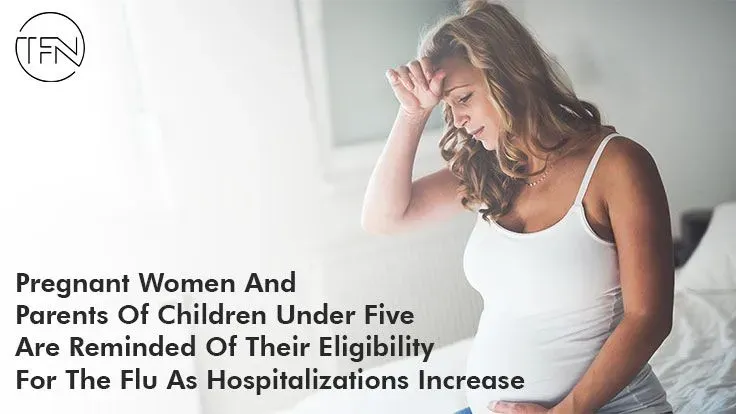This winter, parents are being encouraged to safeguard their kids against the flu due to an increase in severe cases among children under the age of five.
According to statistics, hospitalizations for flu in young children are about 20 times more than they were last year. This week, 230 children under the age of five were admitted, compared to only 12 at this time last year.
According to estimates, hundreds more children under the age of five have been hospitalized over the previous six weeks due to the virus.
The number of children aged two to three who have had their flu shot so far this year is just under 35% (34.1% of two-year-olds, and 35.8% of three-year-olds), which is 9% less than it was at this time last year, despite NHS England's invitation.
The NHS is writing to more than 800,000 parents to urge them to take their kids to a GP office before Christmas to receive the shot, which is often a nasal spray.
Since the start of this year's vaccination campaign, slightly under four million invitations and reminders have been sent.
"With over 18 million vaccinations now given out, our flu vaccine program continues to make excellent gains in safeguarding the public, but we must make sure no group falls behind," said NHS National Director of Vaccinations and Screening Steve Russell.
"We advise parents to consider receiving their flu vaccine at one of the hundreds of locations that are accessible before the Christmas season since young children, whose health may be impacted by sickness, can also spread the flu to other susceptible family members."
All pregnant women and children born between September 1, 2018, and August 31, 2020, are eligible for a free NHS flu vaccine. Children under five years old will often get a nasal spray unless it is not medically necessary.
However, when winter approaches and we spend more time inside, respiratory infections become more prevalent, therefore it is that we take all reasonable precautions to safeguard ourselves and others, according to Professor Sir Stephen Powis, NHS National Medical Director.
According to research, having the flu while pregnant might lead to difficulties, including the possibility that your baby could be delivered early. Young children may also be in danger, particularly if they have chronic medical concerns, and in recent weeks, hospitalizations have increased.
Therefore, we urge both pregnant women and parents of small children to apply for this essential protection before it is too late.
Maria Caulfield, the minister of health, stated: "Our flu vaccination campaign is moving along well this year, with more than 17 million shots already given out.
"However, it is crucial that everyone eligible continue to sign up for their free vaccine and that parents be informed that 2-3 year-olds are also eligible. Appointments may be scheduled via your GP, and the immunization is often administered through a nasal spray.
"Flu instances are still increasing, and the vaccination is our greatest line of defense to keep us safe this winter. Please don't delay in making an appointment."
Young children may avoid becoming extremely unwell and visiting the hospital by receiving the flu vaccination. It is often given as a short and painless spray up the nose at a doctor's office. The NHS website has further details.
To safeguard not only her kid but also her family from the virus, one mother named Rosie went to her two-year-old to receive his flu shot.
"Flu can be a particularly severe one, so I was eager Seth got vaccinated," said Rosie. "Toddlers bring all kinds of diseases home. The appointment was simple to set up, and the fast nasal spray process was something he didn't dislike at all.
"We were out the door in a few minutes, one happy mom and one safe child!"
Additionally, fewer pregnant women get the flu shot; just 29.6% did so this year, compared to 34.4% last year. Additionally, they are urged to volunteer for the vaccination.
For many others, including expectant women, you may schedule an appointment online, and there are walk-in locations in many cities.
More than 10 times as many NHS beds are now being occupied by flu patients each day as at the beginning of December last year, according to the most recent winter figures.
The most recent weekly winter report also reveals a 40% increase in flu patients hospitalized compared to the prior week, with an average of 482 flu cases being treated daily last week, up from 344.
The incidence of intensive care admission for flu is now greater than for COVID-19 throughout the population, and the UKHSA recently suggested that it was permissible to prescribe antivirals for flu in primary care settings due to the rising amount of flu that was circulating.
"Vaccination is a simple and effective approach to protect you, your child, and loved ones against devastating but preventable effects coming from the flu virus," said Elizabeth Duff, senior policy consultant at NCT.
"Pregnant mothers and their unborn children are both at risk if they get the flu.
Immunization is available at any point during pregnancy.
We advise expecting moms and parents of young children to talk to their doctor, nurse, or midwife about any concerns they may have.
The following young children may get a flu vaccination:
kids who will be 2 or 3 years old on August 31, 2022 (born between 1 September 2018 and 31 August 2020)
All primary school students (Reception to Year 6), certain secondary school students, and children with long-term health issues between the ages of 2 and 17
For kids between the ages of 2 and 17, nasal spray immunization provides the greatest protection. If the nasal spray vaccination is not acceptable for them, an injection of the flu vaccine will be administered.

